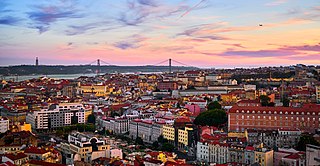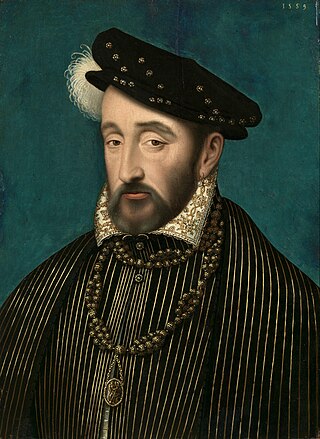
Algeria, officially the People's Democratic Republic of Algeria, is a country in the Maghreb region of North Africa. It is bordered to the northeast by Tunisia; to the east by Libya; to the southeast by Niger; to the southwest by Mali, Mauritania, and Western Sahara; to the west by Morocco; and to the north by the Mediterranean Sea. The capital and largest city is Algiers, located in the far north on the Mediterranean coast.

Brazil, officially the Federative Republic of Brazil, is the largest and easternmost country in South America and Latin America. It is the world's fifth-largest country by area and the seventh most populous. Its capital is Brasília, and its most populous city is São Paulo. Brazil is a federation composed of 26 states and a Federal District. It is the only country in the Americas where Portuguese is an official language. Brazil is among the world's most multicultural and ethnically diverse nations, due to over a century of mass immigration from around the world.

Christopher Columbus was an Italian explorer and navigator from the Republic of Genoa who completed four Spanish-based voyages across the Atlantic Ocean sponsored by the Catholic Monarchs, opening the way for the widespread European exploration and colonization of the Americas. His expeditions were the first known European contact with the Caribbean and Central and South America.

The Society of Jesus, also known as the Jesuit Order or the Jesuits, is a religious order of clerics regular of pontifical right for men in the Catholic Church headquartered in Rome. It was founded in 1540 by Ignatius of Loyola and six companions, with the approval of Pope Paul III. The society is engaged in evangelization and apostolic ministry in 112 nations. Jesuits work in education, research, and cultural pursuits. Jesuits also conduct retreats, minister in hospitals and parishes, sponsor direct social and humanitarian ministries, and promote ecumenical dialogue.

Lisbon is the capital and largest city of Portugal, with an estimated population of 567,131 as of 2023 within its administrative limits and 2,961,177 within the metropolis. Lisbon is mainland Europe's westernmost capital city and the only one along the Atlantic coast, the others being on islands. The city lies in the western portion of the Iberian Peninsula, on the northern shore of the River Tagus. The western portion of its metro area, the Portuguese Riviera, hosts the westernmost point of Continental Europe, culminating at Cabo da Roca.

Paris is the capital and largest city of France. With an official estimated population of 2,102,650 residents in January 2023 in an area of more than 105 km2 (41 sq mi), Paris is the fourth-largest city in the European Union and the 30th most densely populated city in the world in 2022. Since the 17th century, Paris has been one of the world's major centres of finance, diplomacy, commerce, culture, fashion, and gastronomy. For its leading role in the arts and sciences, as well as its early and extensive system of street lighting, in the 19th century, it became known as the City of Light.

Portugal, officially the Portuguese Republic, is a country located on the Iberian Peninsula in Southwestern Europe, whose territory also includes the Macaronesian archipelagos of the Azores and Madeira. It features the westernmost point in continental Europe; its mainland west and south border with the North Atlantic Ocean; and in the north and east, the Portugal-Spain border, which constitutes the longest uninterrupted border line in the European Union. Portugal is the oldest nation-state in Europe. Founded in 1143, its current borders were established in mid-13th century, making them some of the most ancient in Europe and the world. Its archipelagos form two autonomous regions with their own regional governments. On the mainland, the Alentejo region occupies the biggest area but is one of the least densely populated regions of Europe. Lisbon is the capital and largest city by population, and it is also the main spot for tourists alongside Porto, the Algarve and Madeira.

The Philippines, officially the Republic of the Philippines, is an archipelagic country in Southeast Asia. In the western Pacific Ocean, it consists of 7,641 islands, with a total area of roughly 300,000 square kilometers, which are broadly categorized in three main geographical divisions from north to south: Luzon, Visayas, and Mindanao. The Philippines is bounded by the South China Sea to the west, the Philippine Sea to the east, and the Celebes Sea to the south. It shares maritime borders with Taiwan to the north, Japan to the northeast, Palau to the east and southeast, Indonesia to the south, Malaysia to the southwest, Vietnam to the west, and China to the northwest. It is the world's twelfth-most-populous country, with diverse ethnicities and cultures. Manila is the country's capital, and its most populated city is Quezon City. Both are within Metro Manila.

Portuguese is a Western Romance language of the Indo-European language family originating from the Iberian Peninsula of Europe. It is the official language of Portugal, Brazil, Cape Verde, Angola, Mozambique, Guinea-Bissau and São Tomé and Príncipe, and has co-official language status in East Timor, Equatorial Guinea, and Macau. Portuguese-speaking people or nations are known as Lusophone. As the result of expansion during colonial times, a cultural presence of Portuguese speakers is also found around the world. Portuguese is part of the Ibero-Romance group that evolved from several dialects of Vulgar Latin in the medieval Kingdom of Galicia and the County of Portugal, and has kept some Celtic phonology.

Rio de Janeiro, simply Rio, is the capital of the state of Rio de Janeiro. It is the second-most-populous city in Brazil and the sixth-most-populous city in the Americas.

Zeus is the sky and thunder god in ancient Greek religion and mythology, who rules as king of the gods on Mount Olympus. His name is cognate with the first syllable of his Roman equivalent Jupiter.

Henry IV, also known by the epithets Good King Henry or Henry the Great, was King of Navarre from 1572 and King of France from 1589 to 1610. He was the first monarch of France from the House of Bourbon, a cadet branch of the Capetian dynasty. He pragmatically balanced the interests of the Catholic and Protestant parties in France as well as among the European states. He was assassinated in 1610 by a Catholic zealot, and was succeeded by his son Louis XIII.

Henry II was King of France from 1547 until his death in 1559. The second son of Francis I and Duchess Claude of Brittany, he became Dauphin of France upon the death of his elder brother Francis in 1536.

São Paulo is one of the 26 states of the Federative Republic of Brazil and is named after Saint Paul of Tarsus. It is located in the Southeast Region and is bordered by the states of Minas Gerais to the north and northeast, Paraná to the south, Rio de Janeiro to the east and Mato Grosso do Sul to the west, in addition to the Atlantic Ocean to the southeast. It is divided into 645 municipalities, and its. The total area is 248,219.481 square kilometres km2, which is equivalent to 2.9% of Brazil's surface, being slightly larger than the United Kingdom. Its capital is the municipality of São Paulo.

São Paulo is the most populous city in Brazil and the capital of the state of São Paulo. Listed by the Globalization and World Cities Research Network (GaWC) as an alpha global city, it exerts substantial international influence in commerce, finance, arts, and entertainment. It is the largest urban area by population outside Asia and the most populous Portuguese-speaking city in the world. The city's name honors Paul the Apostle and people from the city are known as paulistanos. The city's Latin motto is Non ducor, duco, which translates as "I am not led, I lead."
Latin honours are a system of Latin phrases used in some colleges and universities to indicate the level of distinction with which an academic degree has been earned. The system is primarily used in the United States. It is also used in some Southeastern Asian countries with European colonial history, such as Indonesia and the Philippines, and African countries such as Zambia and South Africa, although sometimes translations of these phrases are used instead of the Latin originals. The honours distinction should not be confused with the honors degrees offered in some countries, or with honorary degrees.
A birth name is the name given to a person upon birth. The term may be applied to the surname, the given name, or the entire name. Where births are required to be officially registered, the entire name entered onto a birth certificate or birth register may by that fact alone become the person's legal name.

Mexico, officially the United Mexican States, is a country in the southern portion of North America. Covering 1,972,550 km2, it is the world's 13th largest country by area; with a population of almost 130 million, it is the 10th most populous country and has the most Spanish speakers in the world. Mexico is a constitutional republic comprising 31 states and Mexico City, its capital and largest city, which is among the world's most populous metropolitan areas. The country shares land borders with the United States to the north, with Guatemala and Belize to the southeast; as well as maritime borders with the Pacific Ocean to the west, the Caribbean Sea to the southeast, and the Gulf of Mexico to the east.

Argentina, officially the Argentine Republic, is a country in the southern half of South America. Argentina covers an area of 2,780,400 km2 (1,073,500 sq mi), making it the second-largest country in South America after Brazil, the fourth-largest country in the Americas, and the eighth-largest country in the world. It shares the bulk of the Southern Cone with Chile to the west, and is also bordered by Bolivia and Paraguay to the north, Brazil to the northeast, Uruguay and the South Atlantic Ocean to the east, and the Drake Passage to the south. Argentina is a federal state subdivided into twenty-three provinces, and one autonomous city, which is the federal capital and largest city of the nation, Buenos Aires. The provinces and the capital have their own constitutions, but exist under a federal system. Argentina claims sovereignty over the Falkland Islands, South Georgia and the South Sandwich Islands, the Southern Patagonian Ice Field, and a part of Antarctica.

















